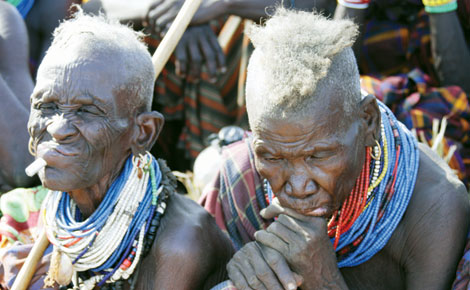 |
|
The community has a deep attachment to cattle and even those who fish are considered poor. But when there is drought, the pastoralist community heads to the lake for survival. [PHOTOS: BY PETER OCHIENG/STANDARD] |
By WINSLEY MASESE
Turkana County Government is banking on livestock and fisheries through value addition to lift living standards of its people.
Despite abundant resources that Turkana County boasts, it is one of the poorest regions in the country. The ravaging starvation does not help matters. Livestock and fisheries are the mainstay of the community with the potential running into billions of shillings.
Within this backdrop though are efforts by the County and other development organisations to meaningfully utilise the two main economic activities.
Top on the agenda is to strengthen market-based approaches to the local resources and increase their revenue streams for improved livelihoods.
County Pastoral Economy and Fisheries Minister Christopher Ekuwom said that his docket has rolled out plans to ensure that the sector thrives to the advantage of the community.
“We have put a lot of emphasis on the two sectors through various initiatives to ensure their individual potential is harnessed fully,” he said.
“We want the community to work closely in trade to assist and integrate market systems in the county in some of its key economic activities,” he argued. The minister said that this way, Kenyan traders could tap the Ugandan market where they will sell and buy their items of trade.
The efforts are meant to build resilience among the communities. “Drought will be with the community for years to come and we need to build better ways the communities will co-exists,” said John Kang’ethe.
Better pricing
Keeping a large herd of cattle is not the best with the recurring drought and there is thus need to reduce the livestock by selling them when they are health,” he said.
By doing so, Ekuwom argued that the community will fetch better prices unlike selling them when there is drought and cannot fetch any money. He also said plans are under way to encourage the community to diversify their revenue by keeping fodder.
“The Turkana community is a sedentary pastoralist one but we want to encourage them to produce fodder for their animals during times of drought,” he noted.
With a threatened livestock, he urged the community to diversify their revenue streams.
He also said that he would partner with the national government to conduct a survey on the number of cattle in the community to enhance their planning. “It’s difficult to develop plans for the sector without knowing the number.” Ekuwom noted that the county will develop a multiplication and equipment centre to improve livestock production.
Stay informed. Subscribe to our newsletter
“We have embarked on the Eat Fish Campaign, which seeks to encourage the pastoral community to add fish to their menu. This will empower them, besides creating income generating channels along the value chain,” noted Kang’ethe.
He said consequently, the efforts would create entrepreneurial culture where the community can identify business opportunities to create jobs and wealth.
“It’s time we admitted that we will not end drought any time soon hence need to explore ways to build resilience through trade,” Kang’ethe advised.
Kang’ethe noted that through groups charged with different roles, the community could make meaningful use of the resources, especially fish in Lake Turkana. “The community has a deep attachment to cattle and even those who fish are seen as poor. But when there is drought, the pastoral community goes to the lake for survival.”
Through an efficient market system, the community can sell their livestock when they are healthy before drought sets in. Consequently, the community can put the proceeds from the sale into other trade activities and pay school fees for their children who will in turn provide for the families.
 The Standard Group Plc is a
multi-media organization with investments in media platforms spanning newspaper
print operations, television, radio broadcasting, digital and online services. The
Standard Group is recognized as a leading multi-media house in Kenya with a key
influence in matters of national and international interest.
The Standard Group Plc is a
multi-media organization with investments in media platforms spanning newspaper
print operations, television, radio broadcasting, digital and online services. The
Standard Group is recognized as a leading multi-media house in Kenya with a key
influence in matters of national and international interest.
 The Standard Group Plc is a
multi-media organization with investments in media platforms spanning newspaper
print operations, television, radio broadcasting, digital and online services. The
Standard Group is recognized as a leading multi-media house in Kenya with a key
influence in matters of national and international interest.
The Standard Group Plc is a
multi-media organization with investments in media platforms spanning newspaper
print operations, television, radio broadcasting, digital and online services. The
Standard Group is recognized as a leading multi-media house in Kenya with a key
influence in matters of national and international interest.





